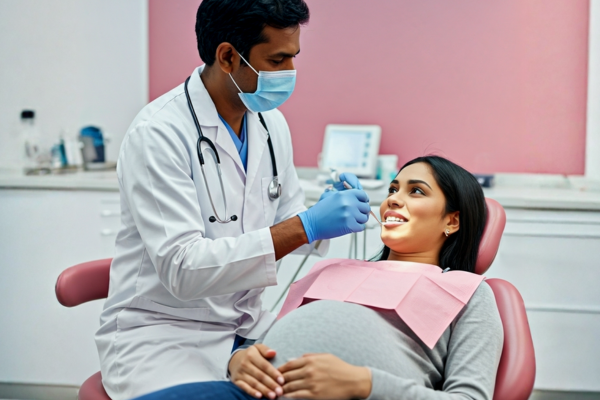Oral Care in Pregnancy: Why It Matters and How to Protect Your Smile
Pregnancy is a time of incredible change—not just for your body, but also for your oral health. While many expectant mothers prioritize nutrition, rest, and prenatal care, oral hygiene often doesn’t receive the attention it deserves. Yet, changes in hormone levels, dietary habits, and morning sickness can significantly impact your teeth and gums.
In this blog, we’ll explore why oral care is especially important during pregnancy, common dental problems to watch out for, and safe dental practices to follow for a healthy mouth—and a healthy baby.
Why Oral Health Matters During Pregnancy
During pregnancy, your body undergoes hormonal fluctuations that can make your gums more sensitive to plaque. This may lead to increased inflammation, swelling, and bleeding—commonly referred to as pregnancy gingivitis. Additionally, if left untreated, poor oral health may be linked to pregnancy complications such as premature birth or low birth weight.
Keeping your mouth healthy isn’t just about preserving your smile—it’s about protecting your overall well-being and that of your baby.
Common Dental Issues During Pregnancy
Pregnancy Gingivitis
This is one of the most common oral issues expectant mothers face. Symptoms include red, swollen, and bleeding gums, especially while brushing or flossing. Gingivitis, if not managed, can progress to more serious gum disease (periodontitis).
Increased Tooth Decay
Changes in diet, frequent snacking, and increased acidity from morning sickness can all increase your risk for cavities. Vomiting exposes your teeth to stomach acids, which can erode enamel and lead to decay.
Pregnancy Tumors
These are non-cancerous growths that can form on the gums, typically during the second trimester. They are usually the result of excess plaque and hormonal changes and often disappear after childbirth.
Safe Dental Care Practices During Pregnancy
Schedule a Dental Checkup Early
Once you know you’re pregnant, inform your dentist. Routine dental exams and cleanings are not only safe but highly recommended during pregnancy. The second trimester (weeks 13 to 28) is often considered the best time for dental treatments, as most fetal organs are developed and morning sickness has usually subsided.
Tell Your Dentist You’re Pregnant
Always inform your dentist about your pregnancy, any medications you’re taking, and any complications. This helps them tailor your treatment plan and avoid procedures or medications that may not be safe during pregnancy.
Postpone Elective Treatments
While essential procedures like fillings or cleanings are encouraged, elective dental work like whitening or cosmetic treatments should wait until after delivery.
Daily Oral Care Tips for Expectant Mothers
Brush and Floss Regularly
- Brush twice a day using a soft-bristled toothbrush and fluoride toothpaste.
- Floss daily to remove plaque between teeth and along the gumline.
- Consider using an alcohol-free mouthwash to reduce bacteria and freshen breath.
Combat Morning Sickness
- Rinse your mouth with water.
- Avoid brushing your teeth immediately after vomiting, as enamel may be temporarily weakened.
- Chew sugar-free gum or rinse with mouthwash if brushing triggers nausea.
Watch Your Diet
- Eat a balanced diet rich in calcium, vitamin D, and phosphorus to support dental health.
- Limit sugary snacks and drinks that can feed cavity-causing bacteria.
- Snack on crunchy fruits and vegetables like apples and carrots to naturally clean your teeth and stimulate gums.
Dental X-Rays and Medications: Are They Safe?
Modern dental X-rays are considered safe during pregnancy, especially when proper shielding (like a lead apron) is used. However, most dentists will delay X-rays unless they are essential for diagnosis and treatment.
As for medications, certain antibiotics and pain relievers are safe during pregnancy, but always consult both your dentist and obstetrician before taking anything.
After Delivery: Don’t Forget the Follow-Up
Your oral health needs attention even after giving birth. Hormone levels begin to return to normal, but the demands of caring for a newborn can easily push oral hygiene to the back burner. If you experienced dental issues during pregnancy or postponed any treatments, schedule a follow-up dental visit soon after your baby arrives.
Final Thoughts
Pregnancy is a unique and beautiful journey, but it comes with its own set of health challenges—including those related to your mouth. With proper care, regular dental checkups, and a healthy lifestyle, you can protect your smile and support your baby’s development at the same time.
Remember, good oral health during pregnancy isn’t just about keeping your teeth and gums healthy—it’s a vital part of overall prenatal care.
Take Care of Your Smile While You Care for Your Baby
Book your prenatal dental checkup today and keep your oral health on track during every trimester.







